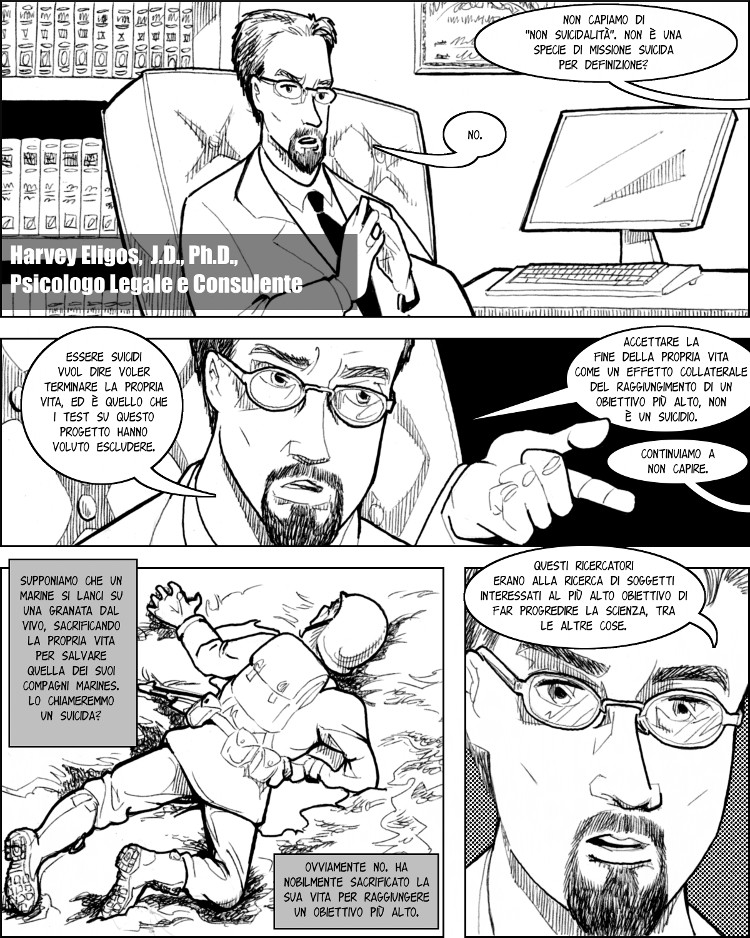

This work is licensed under a Creative Commons Attribution-NonCommercial-ShareAlike 4.0 International License.
PAGE 31 (Four panels)
Panel 1: HARVEY ELIGOS (“Eligos”), an elegant-looking man with a neatly trimmed Van Dyke beard and an expensive suit, sits across a polished wooden conference table in a conference room of a high-priced law firm. He is being interviewed. He looks and in control of his situation.
Unseen interviewer (1): We don’t understand about “non-suicidality.” Isn’t this a sort of suicide mission by definition?
Translation (1): Non capiamo di “non suicidalità”. Non è una specie di missione suicida per definizione?
Eligos (2): No.
Translation (2): No.
SUBTITLE (3): Harvey Eligos, J.D., Ph.D., legal psychologist and consultant.
Comment (3): I’m adding a comment because the meaning of Eligos’s postitial letters might not be obvious in all contexts. “J.D.” stands for juris doctor and represents the terminal degree awarded by most America law schools after a three-year course of study, In most American states, it is a prerequisite for taking a bar examination thus for being licensed to practice law. “Ph.D.” is short for philosophiae doctor and is a terminal degree awarded in American universities for completion of a program of advanced graduate study in an academic field and is generally regarded a prerequisite for a permanent appointment teaching in a university.
Translation (3): Harvey Eligos, J.D., Ph.D., psicologo legale e consulente.
Panel 2: Harvey, still in control, continuing his response to the interviewer.
Eligos (4): To be suicidal means wanting to end one’s life, and that’s what the testing on this project was meant to screen out.
Translation (4): Essere suicidi vuol dire voler terminare la propria vita, ed è quello che i test su questo progetto hanno voluto escludere.
Eligos (5): Accepting the end of one’s life as a side-effect of achieving a higher goal, that’s not suicide.
Translation (5): Accettare la fine della propria vita come un effetto collaterale del raggiungimento di un obiettivo più alto, non è un suicidio.
Unseen interviewer (6): We still don’t understand.
Translation (6): Continuiamo a non capire.
Panel 3: View of a dead United States Marine (WWII era), lying face down in the mud, his rifle and various battle detritus strew about his corpse.
CAPTION – ELIGOS NARRATING (7): Suppose a Marine throws himself on a live grenade, sacrificing his own life to save those of his fellow Marines. Would we call that a suicide? Of course not. He nobly sacrificed his life to achieve a higher goal.
Comment (7): “A Marine,” that is a member of the United States Marine Corps, a land-combat branch of the United States Navy.
Translation (7): Supponiamo che un Marine si lanci su una granata dal vivo, sacrificando la propria vita per salvare quella dei suoi compagni Marines. Lo chiameremmo un suicida? Ovviamente no. Ha nobilmente sacrificato la sua vita per raggiungere un obiettivo più alto.
Panel 4: Close-up on Eligos’s face.
Eligos (8): These researchers were looking for subjects interested in the higher goal of advancing science, among other things.
Translation (8): Questi ricercatori erano alla ricerca di soggetti interessati al più alto obiettivo di far progredire la scienza, tra le altre cose.
![]() Esca (Italiano/Versione a pagina lunga)
Esca (Italiano/Versione a pagina lunga)
Esca (Italiano/Versione con slider)
